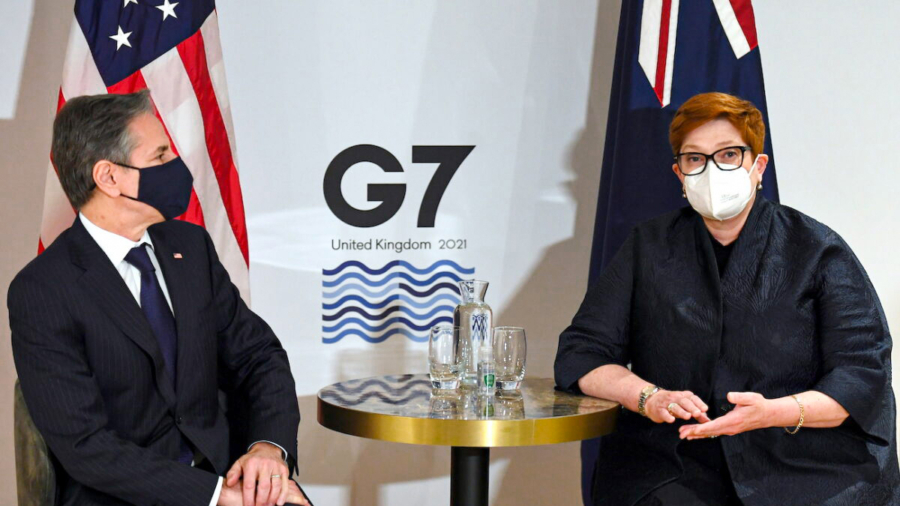Australian Minister for Foreign Affairs Marise Payne and U.S. Secretary of State Anthony Blinken met on Saturday and reaffirmed their nations’ combined efforts to promote peace and prosperity in the Indo-Pacific, amid concerns over China’s military and economic ambitions in the region.
The two diplomats also “discussed deepening the U.S.-Australia alliance, the importance of committing to ambitious climate action in the next decade, and the need for like-minded allies and partners to continue to defend, strengthen, and renew democracy around the world,” state department spokesperson Ned Price said in a statement.
In addition, they “expressed concern over Russia’s ongoing aggression against Ukraine and reiterated support for a peaceful resolution of cross-Strait issues without resorting to threats or coercion and emphasized Taiwan’s important contributions to global health development,” Price said.
He added that Blinken and Payne also “agreed on the importance of having a Senate-confirmed Ambassador in place” in Canberra—Australia’s capital city—”as soon as possible in light of the scope and scale of shared challenges we face.”
The meeting came on the sidelines of a Group of Seven (G7) Foreign and Development Ministers’ Meeting in Liverpool, England, marking the second time the ministers are meeting this year. The G7 forum includes Blinken’s counterparts from Canada, France, Germany, Italy, Japan, and the United Kingdom.
Australian minister Payne joined the meeting as a guest. Ministers from the European Union, South Korea, and India will also take part in some sessions as guests of the G7, along with representatives from the Association of Southeast Asian Nations.
“For the first time, a number of countries from ASEAN will attend, reflecting the world’s increasing focus on the Indo-Pacific and the importance of ASEAN centrality,” Payne announced prior to the meeting.
Both Payne and Blinken had also expressed that the United States and Australia have made progress in their alliance this year, citing their Quad Leaders’ Summit as well as the AUKUS security pact, a new tri-lateral alliance between Australia, the United States, and the United Kingdom.
Experts have told The Epoch Times that the AUKUS pact can play a key role in countering aggression from the Chinese Communist Party (CCP) and promoting a “free and open Indo-Pacific.”
Blinken and Payne’s latest meeting follows a September meeting in Washington at the annual Australia-United States Ministerial (AUSMIN) talks. A joint statement released by the two countries at the time indicated the nations’ commitment to cooperate on technological innovation, develop of secure supply chains, and support human rights and multilateralism—including Australia’s decision to adopt Magnitsky-style human rights sanctions.
Separately on Saturday, Australia, Japan, and the United States signaled they will jointly fund an undersea cable to improve internet connectivity to three Pacific nations—the Federated States of Micronesia (FSM), Kiribati, and Nauru.
“The proposed undersea cable will provide faster, higher quality, and more reliable and secure communications to approximately 100,000 people across three countries,” reads a joint media statement between the six countries.
“This will support increased economic growth, drive development opportunities, and help to improve living standards as the region recovers from the severe impacts of COVID-19.”
Daniel Teng and Reuters contributed to this report.
From The Epoch Times

